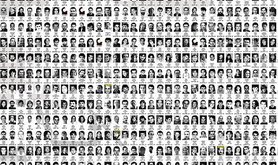
Tunisian General Rachid Ammar announces his resignation on TV, June, 2013. Demotix/ Chedly Ben Ibrahim. All rights reserved. Authoritarianism is on the march. Aggregate Freedom House scores on political rights and civil liberties have declined each of the past nine years. A third of all democratic regimes since the ‘third wave’ of democratization began forty years ago have failed. Authoritarians are methodically cracking down on opposition elements, restricting civil society activity, swapping surveillance and censorship tips and technologies to keep domestic dissent at bay.
It’s true that democracy comes in ‘waves’ of democratization, ebbing and flowing, as described by the late Samuel Huntington. Political scientists including Jay Ulfelder, Steven Levitsky and Lucan Way rightly urge caution when assuming the demise of democracy. We should hardly expect political systems to develop linearly, especially in places like the Middle East, where dictatorships have been rooted for decades usually with strong western support.
Still, growing evidence of democratic backsliding and authoritarian resurgence, chronicled by USIP’s Steven Heydemann is troubling. Russia and Syria are poster children for how authoritarianism has led to international instability. Support for democracy has been a core, bipartisan element of US foreign policy since the time of Woodrow Wilson. While idealism has been a motive; at its core, support for democracy has advanced US national interests. Democracies don’t go to war with each other; they are more reliable partners than tyrannies; they don’t commit mass atrocities; and they are better at reconciling domestic differences peacefully. Systemic corruption and institutionalized discrimination have been key drivers of violent extremism, according to Carnegie scholar-practitioner Sarah Chayes.
Around the world, aggrieved citizens are still standing up to challenge power structures, demanding basic freedoms. The question is. can we avoid citizen challenges leading to bloodbaths and prolonged chaos? How can democratic movements lead to reforms that encourage more durable stability?
Our book, Is Authoritarianism Staging a Comeback? analyzes authoritarian resilience in places like Central Asia, Syria, and the Gulf, highlighting the dilemmas and possible solutions. As Denver scholar Erica Chenoweth demonstrates, mass nonviolent movements, which have historically been major drivers of democratic transitions and twice as successful as armed struggles at overturning dictators, have seen their effectiveness drop in the past few years to levels not seen since the 1950s. According to media expert Zeynep Tufecki, authoritarian regimes are using the internet and state-controlled media to counter challenges to their rule.
What can be done to reverse the tide? First, we should recall that civil society activism, in the form of speech, peaceful assembly, and labor organizing, are protected under international human rights law. Nonviolent activists have a right to receive information and even financial help from external actors, a point underscored by Seton Hall law professor Elizabeth Wilson. Second, the fact that the popular Arab Spring uprisings that toppled four dictators have not produced consolidated democracies doesn’t mean that western powers should give up on democracy in the Middle East – or anywhere else.
It’s hardly surprising that Tunisia, the one Arab Spring country on the best path to democratization, had the most nonviolent and participatory of all the uprisings. Tunisia has a civil society, anchored by strong trade and labor unions, helping to ensure nonviolent discipline during and after the transition. Tunisia’s George Washington, army chief of staff Rachid Ammar, refused regime orders to fire on peaceful demonstrators. This sense of integrity within the ranks of the military, as ex-Director of National Intelligence Admiral Dennis Blair writes about, can be inculcated through contacts with military officers from democratic countries. Military-to-military ties are underappreciated sources of western leverage.
In an era of authoritarian backlash, there is a need for a new breed of diplomacy. Diplomats have a wide range of tools and assets to support pro-democracy movements. Popular uprisings in places like Egypt, which are often led by non-traditional civil society actors took diplomats who are too used to dealing with registered NGOs and CSOs by surprise. Ambassador Jeremy Kinsman and Kurt Basseuner highlight in their Diplomat’s Handbook for Democracy Development Support that everyday diplomatic tools can make a difference. These range from showing solidarity, to physically inter-positioning to deter violence and coordinating allied embassies’ support for democrats. Unfortunately, foreign service officers receive minimal training on how to support democrats.
Helping populations pivot from protests to politics is no simple undertaking. As Stanford’s Larry Diamond emphasizes, the reality is that democratic institutions, strong political parties, and the rule of law take generations to take root. There is plenty of evidence that technocratic tweaking of institutions without such strong civil society engagement doesn’t achieve democratic progress. Successful anti-corruption campaigns around the world, as chronicled by John’s Hopkins fellow Shaazka Beyerle, combine citizen-led action with engagement with government institutions.
Arguably the most important role outside actors can play is helping civic actors pry open space for political engagement. Democracy support foundations and organizations need to develop innovative ways to support civil society, particularly in restrictive spaces. Such support should seek to advance key aspects of successful nonviolent movements, as Peter Ackerman and Hardy Merriman have stressed: unity around goals and leaders, operational planning, nonviolent discipline, diversified participation, movement resilience, and the ability to prompt loyalty shifts in the authoritarian’s key pillars of support. Engaging with broad array of civil society actors, using small, flexible grants to support credible local mobilizers, encouraging sustainable leadership and movement principles and providing convening spaces for activists, traditional civil society and government reformers to mix it up are a few ways to do that.
Acclaimed strategist and Nobel Laureate in Economics Thomas Schelling once said that in the match between repressive regimes and domestic challengers, each side seeks to impose costs on the other side while minimizing the costs to their own side. “It is a contest and it remains to be seen who wins.” As authoritarians around the world seek to consolidate their grip on power, it behooves western actors to get serious about pushing back against the authoritarians, otherwise we risk the current ebb turning into a growing tide against democracy.
Read more
Get our weekly email





Comments
We encourage anyone to comment, please consult the oD commenting guidelines if you have any questions.